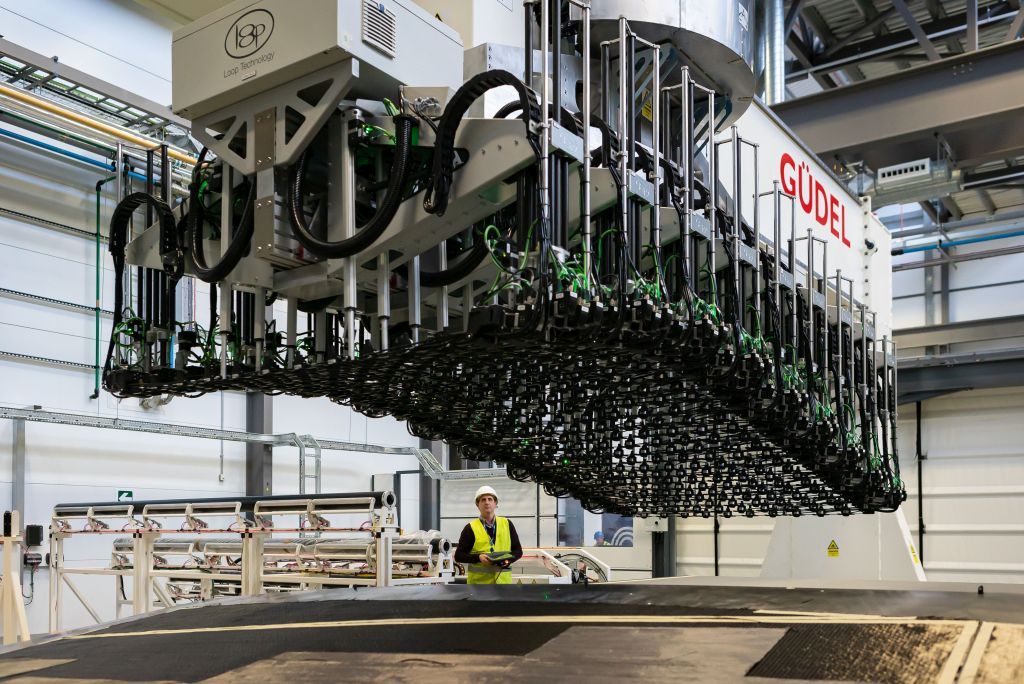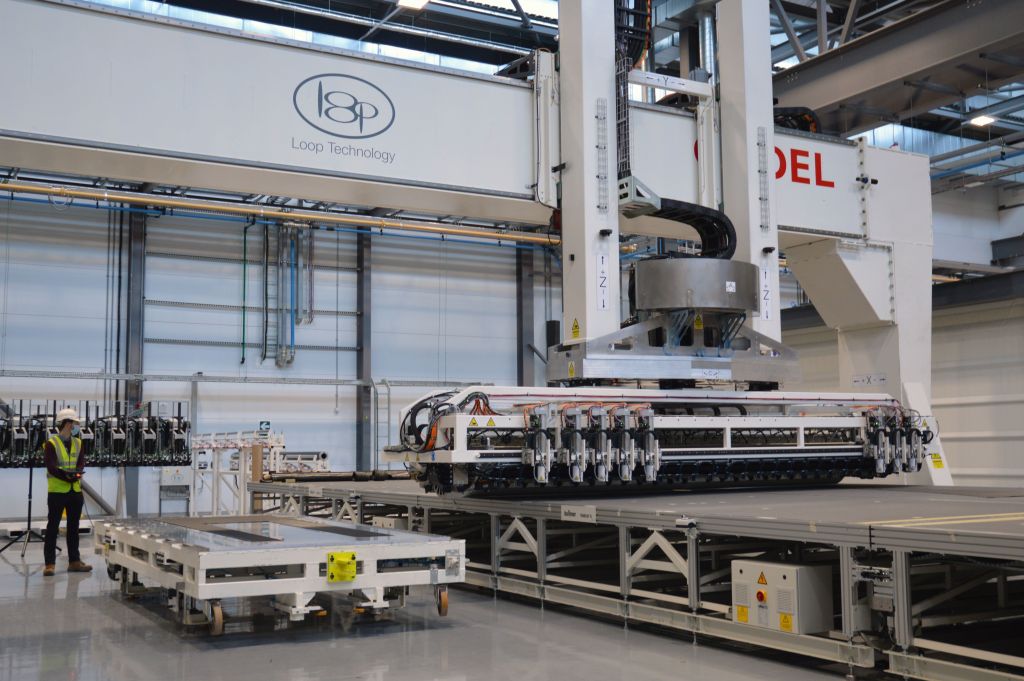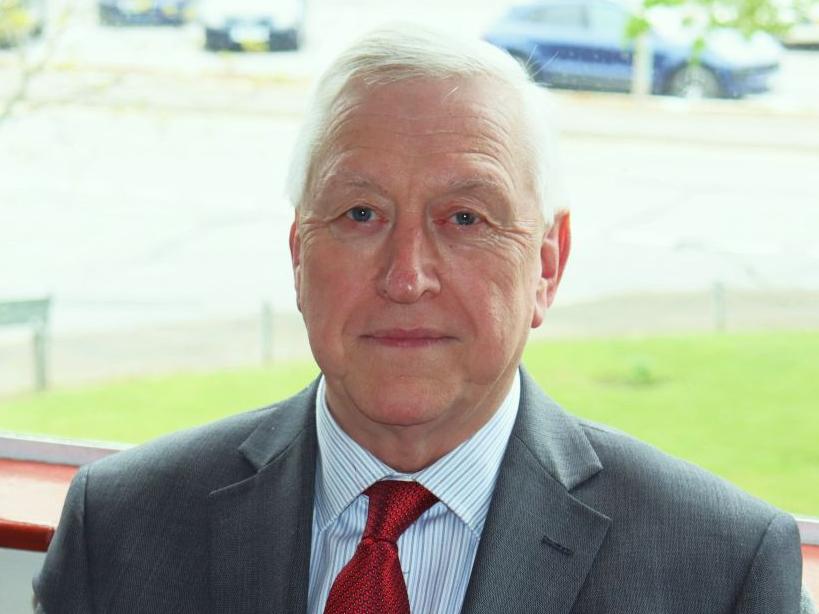The grand designs of curves and lines

Composites in Manufacturing hears how Loop Technology is trailblazing the path of high rate, large scale preforming for the production of composite structures - from raw material in, to preform out.
Loop Technology, the automation specialists and systems integrator behind the National Composites Centre’s (NCC) impressive Ultra High Rate Deposition Cell, says it is trailblazing the path for high-rate, large-scale preforming solutions.
Haven’t heard of Loop Technology? This family-run company is tucked away down in Dorchester in the South West of England and has spent the last 12 years developing innovative technology that the aerospace industry needs to keep up with the growing demand for composites.
This development work has culminated in the launch of Loop Technology’s toolbox of state-of-the-art automation products that deliver an end-to-end preforming solution for the production of composite structures at a remarkably high rate; from raw material in, to preform out. The product range covers automated cutting, sorting, kitting, inspection, stabilisation, trimming, and of course, layup; including two unique solutions targeting deposition rates of 200kg material per hour, one of which won Composites UK’s 2021 Innovation in Composite Manufacture Award. The range even goes as far as automated solutions for cleaning mould tools with laser technology and robotic machining of cured parts.
The company’s reputation for delivering advanced automation solutions for complex and challenging problems has led to contracts with several major aerospace players on a variety of projects – not only for composite preforming, but also for: automated assembly of high value parts; compact, vision-guided, robotic fastening of composite and metallic structures; and more.
Staying in the loop
So, what does your deposition technology offer customers above and beyond a traditional ATL or AFP setup? Well, Loop’s deposition tools FibreFORM and FibreROLL provide a high-volume manufacturing capability that has the potential to consume 40% less energy, in 30% of the space required, and at a 50% reduced cost when compared to other systems such as AFP processes that are only capable of depositing in the region of 20kg of material per hour.

As you’ll have heard before, the deposition rates achievable by ATL and AFP are too low to keep up with the demand for single-aisle shipsets. Pre-pandemic, the industry target was 48 shipsets per month, driving towards 100 per month. With the demand climbing back up post-pandemic, and the ever-increasing pressure of environmental concerns to improve the fuel-efficiency and sustainability of air travel, it is now more important than ever to provide a cost parity between composite and metallic structures, and Loop’s machine can arguably do the same job as several AFP heads.
Loop’s product solutions are most suitable for manufacturers of large, high-rate composite components that require high accuracy. Although they were originally designed with the aerospace industry in mind, for components such as wing skins and empennage, they are also ideal for any application that requires the ultimate solution in terms of rate, accuracy, and quality in the preforming process. This includes other sectors such as railway wagons, bridges, defence, automotive, and urban air mobility for example. Loop is also currently investigating its ability to lay-up spar type structures.
Loop says its tools can deliver the intended process with millimetric accuracy and repeatability – in the regions of up to ±1mm for layup, up to ±0.5mm for cutting, and up to ±0.1mm for inspection.
The company has invested in a £2.4 million demonstrator, the ADvanced Automated Preforming Technology (ADAPT) Cell, currently being constructed inside its Technology Centre in Dorchester. This will allow Loop to provide in-person demonstrations of its product capabilities and perform customer evaluation studies for different materials.
It includes the installation of two large KUKA KR 1000 Titan robots mounted onto a 12m Güdel Trackmotion module. These will form the deployment infrastructure for several of Loop’s composite preforming products.
Phase 1 is due to finish in July 2022, with a FibreFORM ready to start performing evaluation studies. The ADAPT Cell is one of many work packages under ASCEND (Aerospace and Automotive Supply Chain Enabled Development), a UK industry consortium which aims to accelerate the development of composite material and process technologies for the next generation of energy efficient aircraft and future mobility.
Fit for purpose
In terms of the demands and challenges placed on the company in working with large OEMs, Loop says the benefits of the technology are relatively easy to demonstrate - the bigger challenge is working with a customer’s commercial requirements which are often structured for traditional machine tools, like CNC machines and their ability to handle any material.
Although composite materials are becoming increasingly commonplace, many manufacturers aren’t aware of the challenges they introduce to the automation process since they are completely different to say, a billet of metal to be machined. It’s impossible to have a machine that handles absolutely everything since handling and inspection is so material-dependent. That’s why Loop spends the time to lay the groundwork, communicate and work closely with all its customers - large or small - to fully understand their requirements. Relationships are key to developing a fit-for-purpose solution. Without open communications you’re on a hiding to nothing.

Does Loop’s machine tool simulation software allow users to check for optimum material utilisation and any possible head collision detection? It’s a yes on both counts. For optimal material utilisation, Loop is able to nest material on the cutting table to ensure minimal waste. Plies can be cut out of order as the automated kitting system subsequently sorts them into the correct order for layup, whilst material simulation will allow ply books to be validated for manufacturability before any material is even cut.
Loop says it is conscious the systems require significant investment and the layup tools often even more so. Consequently, collision detection is built-in to its offline programming solution. The company’s familiarity with robots means it can monitor the whole system for collision risk - not just the head. Additionally, Loop’s software package RoboSTOP can be used for real-time collision avoidance - even when an operator is jogging the machine manually. Something that can’t be protected against in an offline environment.
So much effort does Loop place on the rise of Industry 4.0 and the Smart Factory philosophies? The company says it was utilising a service-based architecture on its machines for years before ‘Industry 4.0’ was coined as a phrase. This year, it launches its latest software package cyberDRIVE which will include a simple platform for building a digital twin. Because it is integral to the setup of the machine, all the necessary data is readily available and can be rendered in a 3D environment. Additionally, the aforementioned demonstration cell is being developed with powerful VPN IoT edge gateways to showcase what it can offer in terms of data access and analytics.
Push the envelope
Working with a variety of SMEs, Catapult Centres, and large national and global organisations on various innovation projects has enabled Loop to developed a substantial amount of detailed process knowledge that allows it to perpetually push what is ‘state of the art’. The company has had a continuous R&D programme focused on composites running for the last 12 years, improving the material deposition rate and quality, and lowering the energy consumption and cost to make the technology increasingly applicable for more structures and industries.
Loop doesn’t produce composite components itself - instead it is purely focused on the machines and the processing side of things. Consequently, there’s no competition with the customers, which means there’s no conflict of interest. Loop can work closely with them to provide full support with their specific applications and challenges both during machine development and long after commissioning. As a result, Loop has built up a significant number of loyal customers that keep coming back. Its customers end up being its best sales advocates - often referring Loop to others both within their own organisations and externally.
With regard to Loop’s current R&D focus, the company says dry fibre often requires the use of high flow air to generate lift when handling materials. Depending on material properties this can be expensive to run. For its deposition end effectors, Loop is investigating new and emerging gripper technologies in a drive to reduce energy consumption and achieve even better handling characteristics.
Gripping stuff!
Because the company’s systems are very modular, Loop can tailor the gripping element for the material being processed or the requirements of the particular process. Prepreg for example can use a more conventional vacuum gripper while if there is a need to pick multiple plies simultaneously, and the application allows it, needle grippers can be fitted instead. On the composites side of things, the R&D focus mentioned above is still going strong and Loop says it looks forward to sending out the invitations to the unveiling of its ADvanced Automated Preforming Technology Cell (ADAPT).
On the business front, the company recently expanded within the UK, opening remote offices in North Wales and Bristol, and it is currently engaged in a global incubator programme with a specific focus on entering markets in North America, with the intention to open an office there soon.
All in all, exciting times lie ahead for Loop Technology. The company invites you to meet the team at the Farnborough Airshow on the Fanuc stand 1311, where it will be showcasing a scaled-down FibreFORM.









